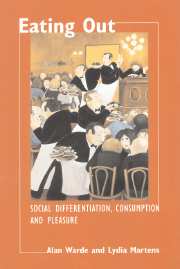Book contents
- Frontmatter
- Contents
- List of illustrations
- List of tables
- Acknowledgements
- 1 Studying eating out
- Part I Modes of provision
- Part II Access
- Part III Delivery
- Part IV Enjoyment: the attractions of eating out
- Part V Conclusion
- 10 Eating out and theories of consumption
- Methodological appendix: data collection and analysis
- References
- Index
10 - Eating out and theories of consumption
Published online by Cambridge University Press: 22 September 2009
- Frontmatter
- Contents
- List of illustrations
- List of tables
- Acknowledgements
- 1 Studying eating out
- Part I Modes of provision
- Part II Access
- Part III Delivery
- Part IV Enjoyment: the attractions of eating out
- Part V Conclusion
- 10 Eating out and theories of consumption
- Methodological appendix: data collection and analysis
- References
- Index
Summary
Events
Western attitudes towards consumption have always been ambivalent. On the one hand, enhanced levels of consumption are inextricably bound up with rising economic production and offer the opportunity to meet the basic human needs of the mass of ordinary people which most societies in history have been unable to do. On the other hand, consumption is morally suspect, associated with unnecessary luxury, self-indulgent hedonism and rampant materialism. Many recent contributions to this ancient debate have argued that modern consumer culture is morally harmless, and even something which might properly be welcomed and celebrated. The pleasures of consumption, including those obtained directly in commodified form, are real and make a major contribution to human happiness. Among the benefits of the practices supported by contemporary consumer culture are that they generate dignified forms of (unpaid) labour, promote an aesthetic attitude to everyday life, sustain many socially meaningful practices like caring and hospitality, provide entertainment and mental stimulation, ensure unobjectionable levels of comfort, permit expression of personal and group identities in rebellious as well as conformist mode and, of course, stimulate economic competition and create employment. Given these positive attributes, if they also provide people with a sense of satisfaction and gratification then it would be perverse to condemn modern consumerism.
One remarkable feature of the survey of English urban populations was the great sense of pleasure and satisfaction that people claim to derive from eating out.
- Type
- Chapter
- Information
- Eating OutSocial Differentiation, Consumption and Pleasure, pp. 215 - 227Publisher: Cambridge University PressPrint publication year: 2000



